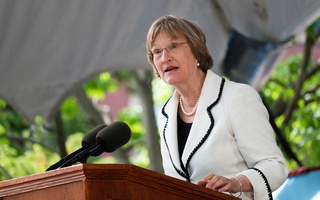HARVARD PROFESSORS long ago discovered that by vibrating their vocal chords at various frequencies they could create air displacements that would smash educationally into the oddly shaped fleshy mounds that hang, often quite humorously, off the sides of students' skulls.
At first many of them found "speech" necessary only in cases of extreme hunger, but the medium was soon recognized as an extremely useful tool for education. There were, of course, experiments with whale noises and certain annoying thwangy sounds, but "speech" quickly became the most prevalent method of audio communication at Harvard.
Yet as the professors' use of "speech" gradually became more extensive, its value decreased proportionally. Like addicts presented with an unlimited supply of heroin professors began to wallow unabashedly in the infinite possibilities of instructional noise. Soon they were trying to fit so much "speech" into one sentence that, well, listen for yourself to an example of the most dreaded of lecture hall horrors--The Harvard Hyperbole (HH):
Tracing the parable of the indelible personae, so to speak, of the quote unquote natural habitat, if you will, in which he indigenously resides, one may assume, in a manner of speaking (or, more specifically, in the manner in which I am speaking, ha ha), obstinate indifference at best, and ornamental pejorativity at worst, as it were.
The power of such uninterrupted speech corrupts, transforming a class from a place to concentrate on "speech" into a place to concentrate on "sleep." Just as there is a limit to the number of Oreos one can eat in a single day, so is there a limit to the number of words that can be meaningfully infused into a single statement. Any more gives you a stomach ache and leaves unsightly black gook in your teeth.
THE ONLY WAY to break the Hyperbolic Habit is to make the professors conscious of it. To this end I suggest the introduction of large electronic scoreboards into lecture halls. The boards will use multi-colored light bulbs to keep track of "as-it-weres," "quote-unquotes," "so-to-speaks," and other annoying phrases or meaningless digressions during lecture.
As the digital scoreboard turns over a tens digit in any of these categories, a bucket of something, such as embarrassing red ink or even cod scallops, will pour from the ceiling onto the offender. This negative reinforcement hopefully will act as a subtle deterrent, reminding the speaker to curtail unnecessary pseudo-intellectual verbiage in his lectures.
Under this system well crafted remarks will be rewarded. Suppose a professor wants to inform a class of his revolutionary interpretation of the main character in a certain play as a Christ-figure. (This will happen in humanities courses every few days, so the example is a good one.) There are two ways the professor can present the information, and our machine will discriminate between them and act accordingly.
SUPPOSE THE professor says, "the main character in this play is a Christ figure. Thank you. Have a good weekend." This will immediately trigger a pleasant sounding latch mechanism, opening a hatch from which a credit towards tenure will fall. If the professor already has tenure, he gets an autographed picture of himself.
However, the professor may say, "It is with unparalleled earnestness that I offer the following results of an inordinate multitude of painstaking hours of tireless scrutiny, for even as one scrutinizes so does one grow tired--hence my previous comment--if you will reminisce--that ingeniously juxtaposed the two words 'tired' and 'scrutiny'. I am, of course getting at the indisputable biblical overtones, or more precisely, if I might be so bold, the form of Christ, as represented in the character, or personae, if I may, of the main character, or personae, if I may, in the plan. Thank you. Have a good weekend."
This professor gets the splash of red ink and cod scallops, and maybe some guacamole too if he continues to speak longer than a few minutes after the class is supposed to end.
If this works, we'll be able to fit twice as many lectures into half the time. Perhaps this will be enough to induce Harvard's ruling bodies to offer undergraduates and adequate amount of vacation time during the school year, or at least half as much as other schools.
Probably not, but at least the elimination of Harvard Hyperbole will afford students the opportunity to hear what a professor has to say. In many cases, this could actually prove quite interesting.
Read more in Opinion
Losing PerspectiveRecommended Articles
-
Winsame & WildeT he Poet lived a life divided by elation and sorrow, each emotion intensifying the glory or bitterness of the
-
BSA Describes Campus As `Hostile Environment'More than 40 black students walked out of a symposium on race sponsored by the conservative magazine Peninsula last night
-
MORISON, BUCK LAUGH OFFDARTMOUTH CHARGEContrary to the statement made yesterday by Professor Ralph A. Burns of Dartmouth College, the majority of Harvrd history teachers
-
Green Is For EnvyFrustrated by their inability for the first time in seven years to sneer at Harvard's inferior football teams, Dartmouth College
-
Professor To Bring Free Speech Motion to FacultyCORRECTION APPENDED A professor who feels academic debate on the Israel-Palestine conflict has been stifled will push the full Faculty
-
 Faust Travels to Mexico, Dallas for Speeches and Donor Events
Faust Travels to Mexico, Dallas for Speeches and Donor Events













